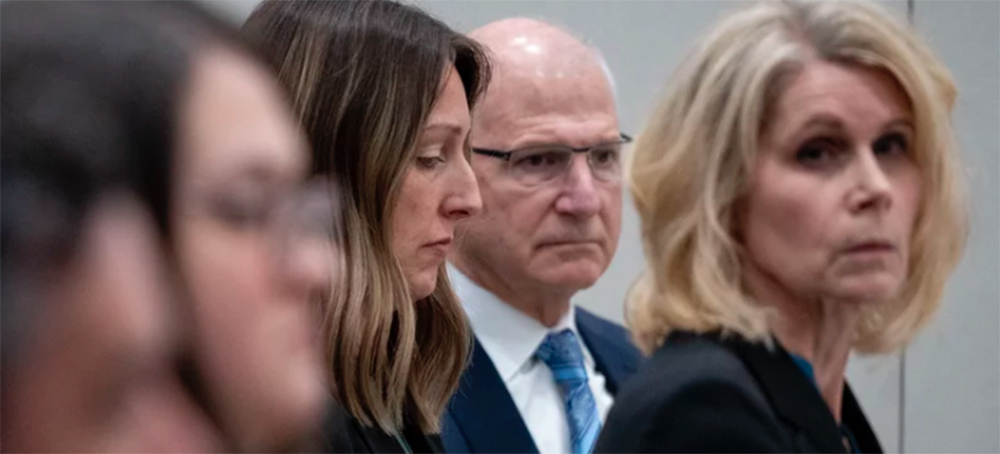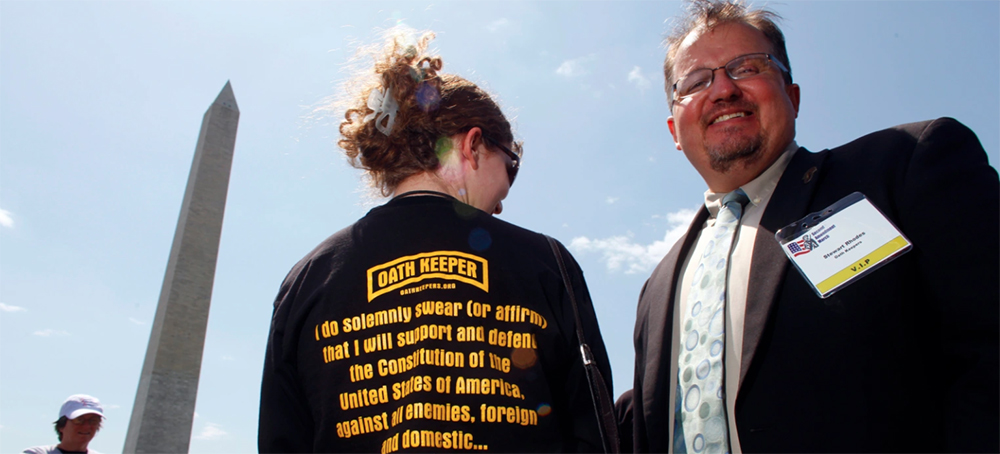
05 June 23
Live on the homepage now!
Reader Supported News
LET’S GET URGENT EARLY — RSN is hurting financially right now. The normal process of slugging it out for days or weeks to see how fundraising goes, that’s not working. We’re in trouble on funding now. The time to get urgent has come.
Marc Ash • Founder, Reader Supported News
Sure, I'll make a donation!

Amazon and Google Fund Anti-Abortion Lawmakers Through Complex Shell Game
Nick Robins-Early, Guardian UK
Robins-Early writes: "As North Carolina’s 12-week abortion ban is due to come into effect on 1 July, an analysis from the non-profit Center for Political Accountability shows several major corporations donated large sums to a Republican political organization which in turn funded groups working to elect anti-abortion state legislators."
Blue-chip companies gave to Republican group funneling money to lawmakers who overturned abortion-ban veto in North Carolina
As North Carolina’s 12-week abortion ban is due to come into effect on 1 July, an analysis from the non-profit Center for Political Accountability (CPA) shows several major corporations donated large sums to a Republican political organization which in turn funded groups working to elect anti-abortion state legislators.
The Republican State Leadership Committee (RSLC) received donations of tens of thousands of dollars each from corporations including Comcast, Intuit, Wells Fargo, Amazon, Bank of America and Google last year, the CPA’s analysis of IRS filings shows. The contributions were made in the months after Politico published a leaked supreme court decision indicating that the court would end the right to nationwide abortion access.
Google contributed $45,000 to the RSLC after the leak of the draft decision, according to the CPA’s review of the tax filings. Others contributed even more in the months after the leak, including Amazon ($50,000), Intuit ($100,000) and Comcast ($147,000).
Google, Amazon, Comcast, Wells Fargo and Bank of America did not respond to requests for comment. An Intuit spokesperson pointed out that the company also donates to Democratic political organizations, and that “our financial support does not indicate a full endorsement of every position taken by an individual policymaker or organization.
“Intuit is non-partisan and works with policymakers and leaders from both sides of the aisle to advocate for our customers,” an Intuit spokesperson said in a statement. “We believe engagement with policymakers is essential to a robust democracy and political giving is just one of the many ways Intuit engages on behalf of its customers, employees, and the communities it serves.”
A Bank of America spokesperson pointed to the company’s policy that donations to so-called 527 organizations such as the RSLC come with the caveat that they only be used for operational and administrative purposes, not to support any candidates or ballot initiatives. The CPA, meanwhile, argues that since the RSLC’s operations are explicitly designed to support candidates and ballot initiatives, such a policy is a distinction without a difference.
Although these companies did not directly give these vast sums to North Carolina’s anti-abortion lawmakers, the CPA’s analysis is a case study in how corporate contributions to organizations such as the RSLC can end up being funneled into anti-abortion causes. When Republican state legislators successfully overturned a veto from the Democratic governor last month to pass the upcoming abortion ban, nine of lawmakers voting to overturn the veto had received campaign contributions from a group with links to the RSLC.
The RSLC, which works to elect Republican lawmakers and promote rightwing policies at the state level, is at the top of a chain of spending and donations which eventually connected to rightwing candidates in North Carolina. This type of spending, which relies on channeling money through various third-party groups from larger organizations, is a common part of modern political campaign financing.
In this case, the RSLC gave $5m to the Good Government Coalition political organization between June and November last year, which in turn gave $6.45m to the rightwing political group Citizens for a Better North Carolina. Finally, that organization gave $1m in independent expenditures to support nine anti-abortion state lawmakers who later voted to overturn the governor’s veto of the abortion bill.
These donations are evidence that corporations are proving to be complicit in the broader movement to limit abortion rights, the CPA non-profit argues, even as many of these companies publicly tout women’s empowerment and employee access to healthcare.
“Companies need to know where their money is ending up,” said Bruce Freed, the president of the CPA. “This should be a lesson – a lesson that they should have taken a while ago but that frankly is driven home right now with what has been happening in North Carolina.”
Several of the companies, including Intuit and Bank of America, made statements last year offering to cover healthcare costs for employees who needed to travel out of state for medical procedures, in some cases explicitly mentioning abortion as an example. Google sent an email to employees acknowledging that Roe v Wade had been overturned and informed them about options for relocating to Google offices in different states.
“Equity is extraordinarily important to us as a company, and we share concerns about the impact this ruling will have on people’s health, lives and careers,” the email stated.
The companies which donated to the RSLC are also large donors to Democratic political groups, and tech giants such as Google and Amazon tend to spend millions each year more broadly on lobbying efforts.
The RSLC, whose board members include former lawmakers, governors and White House advisers such as Karl Rove, boasts on its website that it spent more than $45m on supporting Republican candidates during the 2021 and 2022 election cycle.
In addition to North Carolina’s abortion ban, South Carolina also passed a bill last week that would criminalize most abortions at six weeks into a pregnancy – generally a period before people know they are pregnant. A state judge issued a temporary halt on the ban within hours of Governor Henry McMaster signing it into law, and it will now be reviewed by the state supreme court.
North Carolina’s 12-week abortion ban is scheduled to go into effect on 1 July, drastically curtailing abortion access as many other southern states have passed near total bans.
READ MORE
 A view shows ammunition casing in a damaged street following what was said to be Ukrainian forces' shelling in the course of Russia-Ukraine conflict in the town of Shebekino in the Belgorod region, in this handout image released May 31, 2023. (photo: Governor of Russia's Belgorod Region Vyacheslav Gladkov/Telegram)
A view shows ammunition casing in a damaged street following what was said to be Ukrainian forces' shelling in the course of Russia-Ukraine conflict in the town of Shebekino in the Belgorod region, in this handout image released May 31, 2023. (photo: Governor of Russia's Belgorod Region Vyacheslav Gladkov/Telegram)
Pro-Ukraine Fighters Attack Southern Russia; Offer to Trade POWs
Al Jazeera
Excerpt: "Fighting is ongoing in southern Russia after armed groups launched more cross-border attacks from Ukraine with Moscow saying it targeted the 'terrorists' with artillery fire."
Pro-Kyiv Russian Volunteer Corps and the Legion for Freedom of Russia called on Belgorod governor to meet and retrieve captive Russian soldiers.
Fighting is ongoing in southern Russia after armed groups launched more cross-border attacks from Ukraine with Moscow saying it targeted the “terrorists” with artillery fire.
The governor of the besieged Belgorod region, Vyacheslav Gladkov, said on Sunday that clashes again erupted on his side of the border, and acknowledged for the first time that pro-Ukrainian forces had taken Russian prisoners of war during incursions.
He said he was ready for talks to retrieve “our guys” and told the armed groups he would meet them for the exchange.
“A sabotage group came in. There is combat in [the] Novaya Tavolzhanka [border village],” Gladkov said. “I hope they will all be destroyed.”
The pro-Kyiv Russian Volunteer Corps and the Freedom of Russia Legion called on the Belgorod governor to meet and retrieve captive soldiers.
“The only thing stopping me from negotiating with them is our guys that are in their hands, maybe they are already dead,” said Gladkov.
Ukraine has intensively shelled Russian settlements on the border recently, forcing thousands to flee to the regional hub of Belgorod.
Russia’s military later claimed it repelled a “sabotage group of Ukrainian terrorists” seeking to cross the frontier near the settlement.
“The enemy was hit by artillery. The enemy scattered and retreated,” it said in a statement.
Gladkov earlier asked residents of the Shebekino border district to leave their homes because of the shelling.
‘Sent to the slaughter’
Fighting around Novaya Tavolzhanka follows last month’s dramatic armed incursion from Ukraine that forced Russia’s military to use artillery and air strikes on home soil. The border breach was claimed by anti-Kremlin nationalists.
Earlier, the armed groups published a video addressing the governor. It claimed to show “prisoners” their captors called “simple soldiers sent by your leadership to this war”.
The one minute and 26 second clip showed what appeared to be about a dozen Russian soldiers being held captive, with two lying on hospital beds. A man identifying himself as the commander of the Russian Volunteer Corps said he would hand over the soldiers in exchange for a meeting with Governor Gladkov.
He described the captives as “ordinary soldiers whom you and your political leadership sent to the slaughter”, said a statement posted with the video.
Hours later, Gladkov appeared in a video message in which he agreed to meet the group if the soldiers were still alive.
“Most likely they killed them, as hard as it is for me to say. But if they are alive, from 5-6pm – Shebekino checkpoint. I guarantee safety,” Gladkov said.
The fighter in the video said Gladkov did not turn up at the designated meeting place. “We have already decided the fate of these guys. They will be transferred to the Ukrainian side for the exchange procedure,” he said.
Ukraine officials have predicted the rise of what they call forces opposed to Russian President Vladimir Putin.
“These Russian men took up arms against their will. Soon they will understand the whole vileness and injustice of the war unleashed by Putin,” another Corps member, who did not identify himself, said in the video.
‘The future of Russia’
Ukraine has consistently denied responsibility for attacks on Russian soil, but presidential adviser Mykhailo Podolyak said on Sunday the situation in the border areas “should be viewed as the future of Russia”.
Gladkov said on Sunday that Ukrainian forces continued to shell his region overnight after two people were killed the previous evening and hundreds of children were evacuated away from the border.
The attacks on the Belgorod region come as Kyiv says it is preparing a major counteroffensive against Russian forces.
In a video published on Sunday, the Ukrainian army appeared to call on soldiers to stay silent about the plans and said there will be no announcement on the start of the long-awaited counterattack.
READ MORE
 Members of the Brownsville Safety Alliance keep their eyes and ears open for problems that could become conflicts that would otherwise draw the police. (photo: NYT)
Members of the Brownsville Safety Alliance keep their eyes and ears open for problems that could become conflicts that would otherwise draw the police. (photo: NYT)
What Happened When a Brooklyn Neighborhood Policed Itself for Five Days
Maria Cramer, The New York Times
Cramer writes: "On a two-block stretch of Brownsville in April, the police stepped aside and let residents respond to 911 calls. It was a bold experiment that some believe could redefine law enforcement in New York City."
On a two-block stretch of Brownsville in April, the police stepped aside and let residents respond to 911 calls. It was a bold experiment that some believe could redefine law enforcement in New York City.
It had been a quiet April afternoon until about a dozen teenagers began running up Pitkin Avenue in Brownsville, yelling and cursing. They were chasing a girl of about 14 and it was clear they wanted a fight.
Five plainclothes police officers watched warily. Across Pitkin stood about half a dozen men, civilians in jeans and purple-and-gray sweatshirts.
“They got it,” an officer said.
READ MORE
 Dr. Caitlin Bernard. (photo: Mykal McEldowney/Indianapolis Star/AP)
Dr. Caitlin Bernard. (photo: Mykal McEldowney/Indianapolis Star/AP)
Doctors Rally to Defend Abortion Provider Caitlin Bernard After She Was Censured
Sarah McCammon, NPR
McCammon writes: "Hundreds of Indiana doctors are coming to the defense of Caitlin Bernard, the obstetrician/gynecologist who was recently punished by a state licensing board for talking publicly about providing an abortion for a 10-year-old rape victim."
Hundreds of Indiana doctors are coming to the defense of Caitlin Bernard, the obstetrician/gynecologist who was recently punished by a state licensing board for talking publicly about providing an abortion for a 10-year-old rape victim.
In public statements, doctors across a range of specialties are speaking out against the board's decision, and warning that it could have dangerous implications for public health.
"I hate to say, I think this is completely political," says Ram Yeleti, a cardiologist in Indianapolis. "I think the medical board could have decided not to take this case."
In March 2020, as hospitals everywhere were starting to see extremely sick patients, Yeleti was leading a medical team that had cared for the first Indiana patient to die from COVID. At a press conference alongside Indiana Gov. Eric Holcomb, Yeleti tried to warn the public that the coronavirus was real and deadly.
"I want to explain how real this is," Yeleti said after he stepped up to the microphone to explain the news that day in 2020. "How real this is for all of us."
He and others provided a few basic details: The patient was over 60, had some other health issues, and had died from the virus earlier that day in Marion County, Ind.
"There was a sense of high sense of urgency to get the word out as immediately as possible," Yeleti says now, reflecting on that time. "I think we needed to make it real for people."
So he was alarmed when Indiana's Medical Licensing Board concluded last week that Bernard had violated patient privacy laws by speaking publicly about her unnamed patient.
Last summer, days after the Supreme Court overturned Roe v. Wade, Bernard told The Indianapolis Star she'd provided an abortion for a 10-year-old rape victim who'd had to cross state lines after Ohio banned abortion.
Indiana's Republican Attorney General, Todd Rokita, expressed anger at Bernard after she spoke out about the case.
Her employer, Indiana University Health, conducted its own review last year and found no privacy violations. But the licensing board took up the case after Rokita complained, and voted to reprimand Bernard and fine her $3000.
In an open letter signed by more than 500 Indiana doctors, Yeleti asks the board to reconsider its decision, saying it sets a "dangerous and chilling precedent." The letter is set to be published Sunday in The Indianapolis Star.
Indiana's Medical Licensing Board has not responded to requests for comment.
Another doctor who signed the letter, Anita Joshi, is a pediatrician in the small town of Crawfordsville, Ind. She says speaking in general terms about the kinds of cases she's seeing is often part of helping her patients understand potential health risks.
"I very often will say to a mom who is, for example, hesitant about giving their child a vaccine, 'Well, you know, we have had a 10-year-old who has had mumps in this practice,' " Joshi says.
But now she worries she could get into trouble for those kinds of conversations.
So does Bernard Richard, a family medicine doctor outside Indianapolis. He says it's part of his job to educate the public, just like Dr. Caitlin Bernard did.
"Due to this incident, I had patients who said to me, 'I had no idea that someone could even get pregnant at the age of 10,' " Richard says. "You can easily see how that might be important when someone is making decisions about controversial issues such as abortion. This information matters."
Dr. Tracey Wilkinson, who teaches pediatrics at Indiana University School of Medicine, shares that concern.
"These stories are devastating. They're heartbreaking. I wish that they never existed, but they do," Wilkinson says. "And I think part of the public's lack of belief that this could happen, or did happen, is because there's not enough people talking about it."
Wilkinson, who describes herself as a "dear friend" of Dr. Bernard, signed Yeleti's open letter. She also co-wrote an opinion piece published in Stat News by founding members of the Good Trouble Coalition, an advocacy group for healthcare providers.
The coalition issued its own statement supporting Bernard, and noting that the American Medical Association code of ethics says doctors should "seek change" when laws and policies are against their patients' best interests.
"As a physician in Indiana, everybody is scared. Everybody is upset," Wilkinson says. "Everybody is wondering if they could be next."
READ MORE
 Christopher Casanova, left (with sunglasses) takes a selfie with Danny Eguizabal in front of the Cinderella Castle at Walt Disney World’s Magic Kingdom on June 3 in Lake Buena Vista, Fla. (photo: Thomas Simonetti/WP)
Christopher Casanova, left (with sunglasses) takes a selfie with Danny Eguizabal in front of the Cinderella Castle at Walt Disney World’s Magic Kingdom on June 3 in Lake Buena Vista, Fla. (photo: Thomas Simonetti/WP)
Disney Welcomes Gay Days in Florida as the Feud With DeSantis Rages On
Lori Rozsa, The Washington Post
Rozsa writes: "Mark Stegall and Robert Motz knew they’d made the right decision to travel to Florida when they spotted a sea of people wearing red T-shirts emblazoned with the words 'Say Gay' in front of Walt Disney World’s Magic Kingdom."
Mark Stegall and Robert Motz knew they’d made the right decision to travel to Florida when they spotted a sea of people wearing red T-shirts emblazoned with the words “Say Gay” in front of Walt Disney World’s Magic Kingdom.
The partners from Galesburg, Ill., have been coming to the annual Gay Days celebration at Disney for years and ultimately decided they weren’t going to let travel advisories, new state laws targeting the LGBTQ community and a bitter public feud between Florida Gov. Ron DeSantis and the entertainment giant keep them away.
“We’re here because it’s Gay Days, it’s that simple,” Stegall said Saturday. “Disney welcomes everybody. Maybe the governor of Florida doesn’t, but Disney does.”
The massive Pride Month gathering marked a show of defiance this weekend in a state where librarians have been pulling gay-themed books off the shelves, teachers are no longer allowed to discuss gender identity or sexual orientation and many LGBTQ families feel under attack. Organizers said reservations at the host hotel came in slower than normal. One event — the Taste of Gay Days — was scratched after restaurateurs voiced concerns.
But the show did go on. Rainbow-hued merchandise designed by Disney — including a plush Mickey Mouse waving a Pride flag — flew off the shelves almost as quickly as it could be restocked. Drag queen bingo was held. In the end, all 1,001 rooms at the host hotel were booked, though Gay Days chief executive Joseph Clark said travel warnings from civil rights and equality groups advising against travel to Florida had impacted turnout.
“For some it’s the safety aspect, for others, they don’t want to spend money in a state that doesn’t support them,” Clark said. “My message has been, ‘We need your help here in Florida.’”
Gay Days at Disney began three decades ago to bring together LGBTQ people and families in an environment where they felt included rather than marginalized. While the entertainment giant doesn’t sponsor the event, it has welcomed hundreds of thousands of Gay Days visitors through the years, making it one of the nation’s largest Pride Month events. Travelers dress in red shirts to identify themselves while at the theme parks. There is also an LGBTQ expo, pool parties and a Miss Gay Days pageant contest at other venues nearby.
“The birth of Gay Days was really about being visible at a time when it was dangerous to be visible,” said Brandon Wolf, communications director for Equality Florida. “The same is true now.”
The gathering has encountered head winds in Florida before. Religious groups including the Southern Baptist Convention have protested and boycotted the parks in the past. In 2013, a plane with the banner “Warning: Gay Day at Disney 6/1” was spotted flying around Central Florida. The Florida Family Association, a group that defines its mission as “defending American values,” said it had raised over $16,000 to fly the banners.
“The primary objective of this project is to warn families before they expose their children to Gay Day’s revelry,” the group said in a press release at the time.
Now as DeSantis spats with Disney, the park has become an epicenter for the governor’s culture war against all things “woke” — a term he frequently invokes to push legislation placing restrictions on the LGBTQ community. The feud has drawn criticism even from Republicans who say he has crossed a line in using the powers of the state to target an independent corporation. Disney recently sued DeSantis, alleging the governor violated its First Amendment rights when it was targeted after voicing disapproval of a law critics dub “don’t say gay.”
The Parental Rights in Education law, which prohibits instruction on gender and sexuality in schools, was expanded earlier this year to cover all grade levels. Many teachers and school administrators say the vague language of the law has led them to remove rainbow flags and safe space stickers from their classrooms for fear they could spark a prohibited conversation.
A slate of additional laws targeting the LGBTQ community have recently gone into effect or will later this summer — including legislation banning gender affirming care for minors, prohibiting the use of preferred pronouns for students and teachers, and allowing medical providers to refuse treatment based on moral, ethical or religious beliefs.
DeSantis blames Disney and others for trying to indoctrinate children and has said his policies “protect” children.
“I know all these Republicans are lining up against me to take the side of Disney,” DeSantis said during a recent speech in Iowa, shortly after announcing his presidential campaign. “But I’ll tell you this. We stand for the protection of our children. We will fight those who seek to rob them of their innocence and on that point, there will be no compromise.”
Neither Disney nor DeSantis responded to a request for comment on the Gay Days event.
In the months leading up to this year’s Gay Days, some visitors called in, worried about their personal safety or expressing fear of arrest if they attended one of the event-sponsored drag shows, Clark said. DeSantis recently signed a law forbidding children from attending “adult live performances,” including drag shows, though it punishes venues, not parents. Organizers said they added extra security and medical personnel.
“I don’t blame them for thinking that maybe we’re playing with fire,” Clark said. “They have to trust me and the organization and know that we’re not going to put them at risk.”
For the most part, the event looked and felt like it had in years prior — with some exceptions. The “Taste of Gay Days” was scaled back after the “current political climate” sparked concern from a “large group of our restaurant partners,” the organization announced in a Facebook post.
“Though we adamantly tried to recruit additional vendors, it became clear that we would be unable to provide the exceptional experience that our guests have come to expect,” the group wrote.
Justin May was mingling at a pool party Friday dressed in a tangerine orange one-piece Marilyn Monroe-style bathing suit, getting ready for the next phase of the Miss Gay Days contest.
“I am literally what they’re targeting,” May said. “It’s all so disheartening. And the travel advisories are just keeping people away from supporting our community.”
Events like bingo and pool parties took place outside of Walt Disney World, but inside the Magic Kingdom and Disney’s other theme parks, Gay Days visitors filled lines for rides and souvenir shops — one visitor, dressed in a T-shirt with the words “Don’t Say DeSantis.”
“A lot of people are coming and telling me they love it,” Matt Thompson said.
Rights activists said it’s significant that Disney continues to embrace the event. The company is hosting the annual Out & Equal Workplace Summit, billed as “the largest LGBTQ+ workplace equality event in the world,” in September.
“It says something that Disney has been unwilling to kowtow to DeSantis and his brand of authoritarianism,” said Wolf, the communications director with Equality Florida. “I think that Disney’s refusal to be bullied into submission is a good reminder to others that in this moment, there is no negotiating with people like Ron DeSantis.”
Clark said many Gay Days fans were torn between making the annual pilgrimage to Orlando or staying away to honor the travel advisories. But he believes the current political environment is, “more of a reason to do what we’ve been doing on an annual basis for more than 30 years.”
“And that’s to show everybody that we have a community that supports each other, and that together we’re strong,” he said.
That is the message James Couick, of Orlando, and his friends hoped to send with their presence at the Magic Kingdom on Saturday.
“We’re being targeted by politicians, but our community is still strong,” Couick said. “We’re here to have fun, but we’re also here to say we’re standing up for ourselves.”
READ MORE
 People wave EU and Polish flags during an anti-government demonstration in Warsaw. (photo: Wojtek Radwanski/AFP)
People wave EU and Polish flags during an anti-government demonstration in Warsaw. (photo: Wojtek Radwanski/AFP)
Half a Million March in Warsaw Against Poland’s Ruling Party
Wojciech Kość, POLITICO
Kość writes: "An estimated 500,000 people marched through downtown Warsaw Sunday afternoon in a huge rally against the ruling Law and Justice party, held on the 34th anniversary of the breakthrough election that effectively ended communist rule in Poland."
Massive rally was called by Donald Tusk, whose Civic Platform party is bidding to unseat the ruling Law and Justice party.
An estimated 500,000 people marched through downtown Warsaw Sunday afternoon in a huge rally against the ruling Law and Justice (PiS) party, held on the 34th anniversary of the breakthrough election that effectively ended communist rule in Poland.
The march was called by Donald Tusk, former Polish prime minister and former president of the European Council, who is now leading his Civic Platform (PO) party in a bid to defeat PiS in an election due later this year.
“You’re all here because you have just believed we can win,” Tusk told the crowd, which filled Warsaw’s Castle Square. People in the crowd were holding up white-and-red flags and anti-government placards, including the locally famous ones with eight asterisks, denoting the Polish for “f*** PiS.”
“Here’s my pledge to you today: We are going to win this election and hold PiS accountable,” Tusk said.
The rally, which appeared to be the biggest political demonstration in Poland in decades, took place just a few days after PiS-friendly President Andrzej Duda signed off on controversial legislation setting up a special commission to probe Russian influence on Poland’s security. The commission will have vast powers including slapping whoever is found to be making political decisions under Russia’s sway with a 10-year ban from holding public office.
Poland’s opposition has said that the proposed sanctions of the special commission could be used to remove Tusk from politics under trumped-up allegations.
Following criticism in Poland, as well as from the U.S. and the EU, Duda has since moved to blunt the commission’s powers. That would, however, require another vote in the parliament.
Poland is gearing up for what is set to be a close election this fall. According to POLITICO’s Poll of Polls, Tusk’s Civic Platform is currently trailing PiS. But the ruling party does not have enough support to guarantee it a majority in the next parliament.
The standing of PiS in the polls has weakened in 2023 in the wake of double-digit inflation and an economic slowdown. Both are expected to ease later this year, possibly giving the ruling party some room to outdo the opposition and secure an unprecedented third consecutive term in office.
READ MORE
 PFAS foam gathers at the the Van Etten Creek dam in Oscoda Township, Michigan. PFAS have been used in an extensive array of consumer and industrial applications. (photo: Jake May/AP)
PFAS foam gathers at the the Van Etten Creek dam in Oscoda Township, Michigan. PFAS have been used in an extensive array of consumer and industrial applications. (photo: Jake May/AP)
Top US Chemical Firms to Pay $1.2 Billion to Settle Water Contamination Lawsuits
Carey Gillam and Shannon Kelleher, Guardian UK
Excerpt: "DuPont and two related companies said they would pay close to $1.2 billion to settle liability claims brought by public water systems serving the vast majority of the US population on Friday, just days before the start of a bellwether trial in South Carolina over PFAS contamination."
Dupont, Chemours and Corteva agree deal and 3M also reportedly considering $10bn settlement to avoid trial due to start on Monday
DuPont and two related companies said they would pay close to $1.2bn to settle liability claims brought by public water systems serving the vast majority of the US population on Friday, just days before the start of a bellwether trial in South Carolina over PFAS contamination.
PFAS maker 3M was reportedly also considering a settlement that would keep the company from having to face allegations that it was responsible for knowingly contaminating drinking water supplies around the United States.
The trial set to start on Monday is expected to shine a light on long-held secret documents about the chemical giant 3M’s knowledge of the dangers of its per- and polyfluoroalkyl substances (PFAS). 3M has previously announced it will exit PFAS production by 2025.
DuPont and its related companies were recently severed from the case, as they negotiated the settlement in which DuPont will pay roughly $400m ; Chemours, a DuPont spinoff, will pay $592m; and another DuPont-related company, Corteva, will pay about $193m.
The companies said the settlement excludes personal injury claims due to alleged exposure to PFAS, as well as claims by state attorneys general about PFAS contamination of natural resources.
Bloomberg reported on Friday that 3M was negotiating a $10bn payout that would resolve claims and avoid Monday’s trial.
Asked about a potential settlement, 3M said in a statement: “We don’t comment on rumors and speculation.”
3M said earlier in a court filing that it was not liable and that it “never owned, operated, or otherwise controlled the facilities, disposal sites, and other purported sources of PFAS or related compounds”. The company lacked the “necessary controls over its products after the point of sale”, it said in the filing.
The company said in a statement that it was working to stop the use of PFAS across its product portfolio by the end of 2025, even though “PFAS are safely made and used in many modern products”.
4,000 other plaintiffs
The plaintiff in the trial scheduled to start on Monday is the small city of Stuart, Florida, which is suing over the contamination of its drinking water with two types of PFAS called PFOS and PFOA that were used in firefighting foam by local firefighters.
More than 4,000 other plaintiffs are also part of the broader litigation being overseen by the US district court in Charleston, South Carolina. The multi-district litigation (MDL) aims to recover the expenses public and private water utilities are incurring to test, monitor and replace water supplies and to install equipment to try to clear the chemicals from tainted systems.
Stuart, a city of about 17,000 people on Florida’s Atlantic coast, discovered its drinking water wells had been contaminated in 2016 when state regulators informed city officials that some of its well water contained levels of PFOA and PFOS higher than what the Environmental Protection Agency (EPA) considers safe. Ultimately, nearly all of the city’s wells were found to contain some level of PFOA or PFOS.
The city traced the contamination back to “aqueous film-forming foams” (AFFF) the local fire department had used in training exercises for decades, unaware that the work to protect public safety was instead potentially putting it at risk due to the dangerous chemicals in the foam.
The city has since installed an ion exchange filtration system that is designed to reduce the levels of PFOS and PFOA to undetectable levels, said Michael Mortell, Stuart city attorney and interim city manager. The city wants 3M – not the taxpayer – to shoulder the expense. The city is also seeking punitive damages for 3M’s alleged “wrongful conduct”.
The Stuart case, like the thousands of others pending, alleges that 3M knew by the 1970s that PFOA and PFOS could endanger human health and the environment, but decided to hide the knowledge from the public and regulators, and continued to manufacture the chemicals, including for use in the firefighting foam.
Attorneys for Stuart are planning to build their case in part on 3M’s own internal records, many of which were made public after Minnesota officials negotiated an $850m settlement with 3M in 2018 over PFAS water contamination the state alleged caused cancers and other health problems in residents.
“They knew that their chemical … was in the blood of the general population: every man, woman and child,” said McWilliams, one of Stuart city’s lawyers, summarizing a position the city plans to make in court. “They deliberated whether or not to tell the EPA. They ultimately decided not to. And then they sat on it for 22 years.”
Even after the EPA pressured 3M to stop making PFAS chemicals used in firefighting foam in 2002, the company allegedly failed to warn users and the public about harmful foam that remained on the market or to recall the harmful products.
PFAS, sometimes called “forever chemicals” because they do not naturally break down, have been used in an extensive array of consumer and industrial applications due to their resistance to water, oil and heat, and are present in everything from pizza boxes and pesticides to plastics and paints.
The EPA says PFAS residues persist in water, soil, air and food, as well as common materials in homes and workplaces. Scientists have additionally determined that the toxins are now commonly found in the bodies of people and animals worldwide. An estimated 97% of Americans have PFAS in their blood, according to a study by the Centers for Disease Control and Prevention (CDC).
“Next to global warming, this is the biggest environmental catastrophe to ever happen,” said Ned McWilliams, one of the lawyers representing the Florida town in the upcoming trial.
A collection of some of 3M and DuPont’s internal files dating back to the 1960s are expected to be introduced as evidence, according to plaintiffs’ attorneys.
Testimony from retired 3M toxicologist John Butenhoff is also expected to be presented in the trial. In a video deposition taken before the trial, Butenhoff acknowledged that 3M is more than likely the source for PFOS contamination around the globe, including in air, waters, soil, humans, fish, polar bears and “other Arctic mammals”.
“More likely than not the source is 3M,” Butenhoff states in his testimony.
READ MORE
Contribute to RSN
Follow us on facebook and twitter!
Update My Monthly Donation
PO Box 2043 / Citrus Heights, CA 95611










